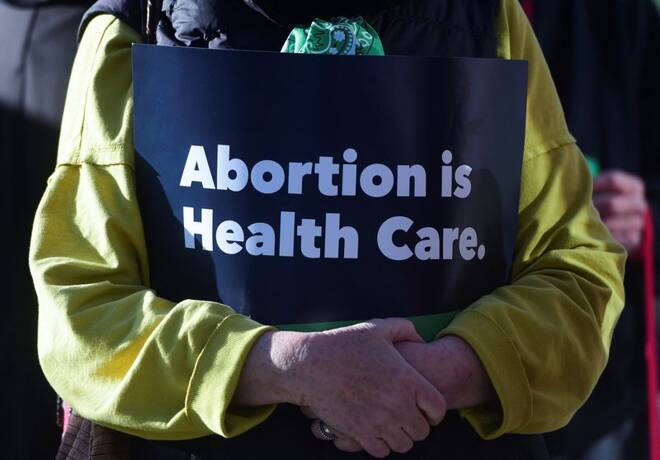Advertisement
Advertisement
Factbox-U.S. state abortion legislation to watch in 2023
By:
By Gabriella Borter and Sharon Bernstein
By Gabriella Borter and Sharon Bernstein
(Reuters) – State legislatures are wrestling with how much to restrict or expand abortion access after the U.S. Supreme Court overturned Roe v. Wade last year.
Here is a snapshot of pending and passed legislation seeking to restrict or protect access in 2023.
Restrictions
FLORIDA: Florida’s Republican-led Senate passed a six-week abortion ban on April 3, which includes exceptions for rape, incest, human trafficking and the life and health of the mother. It is now being considered by the House, and Republican Governor Ron DeSantis has signaled his support. Meanwhile, a 15-week ban is in effect and is being challenged in court.
KANSAS: Although Kansans voted in favor of state abortion rights on a ballot measure last year, the Republican-led state Senate has passed a prohibition on prescribing abortion pills via telemedicine. The House is considering the measure.
IDAHO: Idaho’s Republican-led Senate passed legislation on March 31 that would make it illegal to help a minor cross state lines to get an abortion without the permission of a parent or guardian. Offenders would face two to five years in prison. The Republican-led state is currently enforcing a total abortion ban, with exceptions for rape, incest or the life of the mother.
MONTANA: The Republican-led state Senate has passed a bill seeking to overturn a 1999 state Supreme Court ruling that found that the state constitution protected a right to abortion. That ruling has prevented lawmakers in the conservative state from restricting abortion further than the current 24-week limit. The bill is being considered by the House.
The House in March passed legislation seeking to ban abortion after 12 weeks, which is now under Senate review, and the House is also considering a bill that would limit abortion access for Medicaid patients.
NEBRASKA: Lawmakers in Nebraska’s 50-seat unicameral legislature have introduced a six-week abortion ban. While supporters say they have a slim majority to allow the bill to move forward for consideration, one member has proposed amending it to allow abortions up to 12 weeks. Abortion is currently legal in the state up to 22 weeks.
NORTH CAROLINA: House Republicans have introduced a bill to ban abortion from conception, except to preserve the life or health of the mother. Abortion is currently legal up to 20 weeks. If it passes the legislature, the bill would likely be vetoed by the Democratic governor and would need Democratic lawmakers’ backing to override the veto.
SOUTH CAROLINA: Despite the fact that the state Supreme Court recently struck down a six-week abortion ban in a 3-2 vote, Republicans have introduced a near-total abortion ban and a six-week ban this year. Both bills have passed one chamber and have been transferred to the other for consideration; the Senate has passed the six-week ban, which includes some exceptions, and the House has passed the near-total ban.
TEXAS: While abortion is completely banned with very limited exceptions in Texas, Republican state representatives have introduced legislation that would compel internet providers to block websites that supply abortion pills or provide information on how to obtain an abortion.
UTAH: Republican Governor Spencer Cox in March signed legislation to prohibit the licensing of abortion clinics, which abortion rights advocates say would effectively eliminate access in the state. Abortion is currently banned after 18 weeks in Utah.
WYOMING: The Republican-led state legislature passed a bill in March banning the use or prescription of medication abortion pills, and Republican Governor Mark Gordon signed it into law. It is due to take effect July 1. Abortion is currently legal until viability, about 24 weeks, while a state court is reviewing a challenge to a near-total “trigger” ban, which was prompted to take effect when Roe v. Wade was overturned.
WEST VIRGINIA: Republican state senators have introduced a bill to remove the rape and incest exceptions from the state’s near-total abortion ban, which is currently in effect.
Protections
CALIFORNIA: A Democratic state senator has introduced a bill to protect doctors who prescribe medication abortion pills to patients in other states.
MICHIGAN: Democratic Governor Gretchen Whitmer on Wednesday signed legislation repealing a 1931 bill that criminalized abortion.
ILLINOIS: Democratic Governor J.B. Pritzker in January signed a law protecting abortion providers and out-of-state patients from legal attacks waged by other states.
MINNESOTA: Democratic Governor Tim Walz in January signed legislation passed by the Minnesota legislature’s new Democratic majority that codifies abortion rights in state law, as well as a right to contraception and fertility treatment. The Democratic-led House passed a bill to shield abortion providers and patients from other states’ legal attacks, and the Senate is considering it.
OHIO: Abortion rights supporters are trying to collect enough signatures to put a constitutional amendment on the November 2023 ballot that would assert a right to abortion. Abortion is currently legal up to 22 weeks.
(Reporting by Gabriella Borter in Washington, D.C., and Sharon Bernstein in Sacramento, California.; Editing by Colleen Jenkins, Matthew Lewis and Aurora Ellis)
About the Author
Reuterscontributor
Reuters, the news and media division of Thomson Reuters, is the world’s largest international multimedia news provider reaching more than one billion people every day. Reuters provides trusted business, financial, national, and international news to professionals via Thomson Reuters desktops, the world's media organizations, and directly to consumers at Reuters.com and via Reuters TV. Learn more about Thomson Reuters products:
Advertisement
